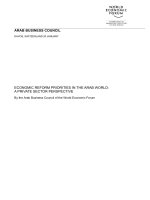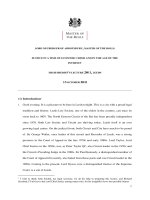ECONOMIC REFORM PRIORITIES IN THE ARAB WORLD: A PRIVATE SECTOR PERSPECTIVE docx
Bạn đang xem bản rút gọn của tài liệu. Xem và tải ngay bản đầy đủ của tài liệu tại đây (93.83 KB, 5 trang )
ARAB BUSINESS COUNCIL
DAVOS, SWITZERLAND 20 JANUARY
ECONOMIC REFORM PRIORITIES IN THE ARAB WORLD:
A PRIVATE SECTOR PERSPECTIVE
By the Arab Business Council of the World Economic Forum
2
The Arab Business Council (ABC) of the World Economic Forum was established in June
2003. The Council’s mission is to be committed to reinforcing and enhancing competitiveness
in the Arab region by focusing on cooperating with the region’s governments and
organizations towards the development of economic policies; reinforcing the voice of Arab
business leaders in the international community, specifically on issues affecting the region’s
socio-economic and development agenda; and serving as the advisory body to the World
Economic Forum on its Arab world strategy.
The Arab Business Council realizes that the Arab world today stands at a very critical
juncture. Sustaining the status quo will only widen the development gap between this region
and the developed world – not to mention the growing number of developing countries and
regional blocs that are taking rapid measure to integrate into the global economy. This has
been identified and reaffirmed by a number of studies, the most recent of which include the
UNDP Arab Human Development Report and The Arab World Competitiveness Report.
The Arab Business Council aims to galvanize the Arab private sector to play a key role in
partnership with governments to enhance the Arab world’s competitiveness and the region’s
potential. The Council initiated constructive dialogue with several Arab governments to
support its business-government partnership initiative. Several meetings were held with key
Arab leaders who encouraged the goals and objectives of the Council. Government ministers
were appointed in Jordan, Egypt and the United Arab Emirates to act as the focal point
between the government and the ABC.
In supporting its business-government initiative, the Arab Business Council identified
economic reform priorities based on an open channel of communication between
government, the business community and civil society. The Council developed the following
specific reform measures that are suggested to be undertaken by governments and civil
society in the Arab world in order to realize the full potential of this region, and propel growth
to higher and sustainable levels.
I) Economic Liberalization and Reform
Enhancing the economic performance and, thus, improving the standards of living in the Arab
world necessitates focusing on achieving the following objectives:
• Most Arab countries have managed to attain a level of economic stability that is
comparable with the best performing regions in the world in terms of macroeconomic
management. Arab governments must sustain this macroeconomic stability as the
solid foundation for other reform measures.
• Arab governments must boost the levels of trade and investment to propel growth,
combat poverty and unemployment, and integrate regionally and globally. The
governments need to take accelerated measures to improve the region’s investment
and trade climate through:
1. Attaining a higher degree of global economic integration through trade
liberalization schemes, both in goods and services, and moving towards the
Harmonization of Trade Policies to assure the success of the Greater Arab
Free Trade Area (GAFTA). This includes adopting trade policies and
practices that are based on internationally agreed rules and procedures, in
addition to extending the classical instruments governing trade, like customs
tariffs in goods, to include non-tariff measures, trade in services, the
protection of intellectual property rights, trade-related investments, etc.
2. Expanding and diversifying the export base by focusing on the services
sectors and high value added products. Incorporating enhanced levels of
technical innovation into the production process of existing and new products
will enable Arab countries to tap into additional non-traditional export
markets. The current export structure, which relies heavily on factor
endowment and low-cost labour, will not provide the platform from which
3
Arab economies can leapfrog. Sustaining this structure will continue to
expose the region to commodity price volatility risks, and subsequently to
high-cost implications on the budget and trade balance. Furthermore,
emphasis on low-labour costs will not necessarily improve productivity,
standards of living or growth levels.
3. Diversifying exports, driven by entrepreneurial dynamism. In order for
entrepreneurship to thrive, policy-makers need to create environments that
allow market forces to freely interplay, and foster stability and a high degree
of predictability in order to enable investors to make long-term decisions.
4. Providing all forms of support for exporters in order to facilitate the flow of
trade regionally and internationally. In the immediate term, focus must be
made on building institutional capacity, incorporating technology, and
streamlining and simplifying all trade-related procedures, including customs.
5. Channelling additional investment into upgrading the trade-related
infrastructure, including roads, ports, airports and storage and handling
facilities. This will have positive implications on the cost of trade, thereby
enhancing the competitiveness of regional exporters.
6. Reducing exchange rate misalignment and overvaluation in order to enhance
competitiveness and the diversification of exports. Misalignment and
overvaluation have been closely linked with fixed and pegged nominal
exchange rates. While this has served governments in their macroeconomic
management in terms of containing inflation, it had adverse implications on
growth and trade.
7. Improving access to trade financing, particularly to small exporters with
limited resources.
8. Eliminating government monopoly rights in the distribution of imports to
encourage higher levels of FDI.
9. Removing restrictions on foreign investment (on sectors and ownership
levels).
10. Channelling additional qualitative investments into the development of human
resource skills in a manner that is in line with the evolving requirements of
global labour markets to attract more FDI that is tied to higher value added
economic activities.
11. Taking additional steps to engage the private sector as a necessary and vital
partner in the development process through the acceleration of the
privatization process; the implementation of large development projects; the
qualitative investment in infrastructure development and structural reforms
including the financial, administrative and judicial sectors; the enhancement
of the legislative and policy framework; and the encouragement of market
openness and global integration, which will create an environment conducive
to business investment.
The Arab Business Council plans to continue its effort by:
• Establishing contact with decision-makers to present the problems and challenges
faced by the private sector and seek ways to implement appropriate solutions for
them.
• Suggesting the establishment of a commission or a mechanism for economic dispute
settlements in Arab countries with an institutional and effective framework.
4
•
Launching various campaigns regarding the role and objectives of the ABC and
reaching out to the largest number of Arab countries and specific segments of
society, especially women and youth.
II) Governance
Economic reform necessitates the development of governance systems in the Arab region. In
this vein, the region’s economic prospects will be better served through identifying and
addressing the following priorities:
• Respecting the rule of law and enhancing transparency especially with regard to
economic data and policy-making procedures.
• Addressing corruption and favouritism.
• Developing an effective public-private partnership, and fostering the role of civil
society and private sector institutions in the social development process.
• Enhancing accountability and securing full protection of property rights.
• Developing government performance through elevating the quality of public sector
institutions by reducing red tape and corruption.
• Promoting adequate institutional and legal mechanisms for arbitration and dispute
settlement so as to boost consumer and business confidence to increase local and
foreign investment.
• Developing the Arab judicial system, ensuring judicial independence and addressing
inefficiency in the administration of justice and the low quality of judicial and legal
training.
• Activating the role of women and youth in society.
The Arab Business Council aims to continue its effort by creating an awareness programme
on the importance of improving governance to develop the Arab economies, enhance their
competitiveness and allow further integration globally.
III) Human Resource Development
Human capital is a key component of economic reform in the Arab region, and its further
development is essential to enhance the region’s competitiveness and integration around the
globe. In order to develop human resources in the Arab region, the following priorities are
addressed:
• Governments need to take additional measures to improve the efficiency and quality
of education offered in their educational institutions, and to better align the knowledge
and skill outputs of their educational systems with the changing and evolving needs of
the global economy. Governments must begin in earnest to redefine the learning
objectives they will pursue, and thoughtfully consider how education can be better
organized to assure the development of a sustainable capacity to compete in a
changing and evolving global economy.
• Vocational and technical training must also receive considerable attention. Focus
must be made on reorienting training from an information-based training model, to
one that is demand-driven, competency-based and provides the employability skills
required to increase worker productivity, technological adaptation and innovation.
• Productivity at the macro and micro levels remains below the desired levels.
Productivity gains will only be brought about through advances in scientific knowledge
5
and technology, in other words through enhanced levels of research and
development (R&D). The R&D infrastructure in the Arab world is still very weak, and
all modest efforts are fragmented. This is due to the absence of an institutionalized
framework that links research and academic institutions with the production base, in
addition to the negligible qualitative and quantitative levels of public and private
investment in R&D.
• Restricting the participation and contribution of women in all spheres of public life
limits the economy’s potential to employ its human talent effectively, and ultimately
holds back its growth potential. Attaining equality, and allowing women to become
productive members of society, is therefore not only an issue of justice for women –
although a principal cause on its own – but also an important factor in achieving
sustainable development. Only through the greater integration of women in society
can the aspirations of the region for greater prosperity be realized.
• The need to expand the capacity for knowledge acquisition by greater investment in
IT infrastructure via concerted efforts to foster research and technology development
must be recognized.
The Arab Business Council is committed to working in partnership with the Arab governments
in order to enhance competitiveness, improve governance and increase investment in human
capital to further integrate the region in the global economy on a win-win basis. The Council
has incorporated a full programme in 2004 to support the Arab region in taking its rightful
place in a fast evolving, tightly integrated global environment. At its Winter Meeting in Davos,
the Council’s the last six months of work will be reinforced as it launches initiatives to
implement its objectives.









